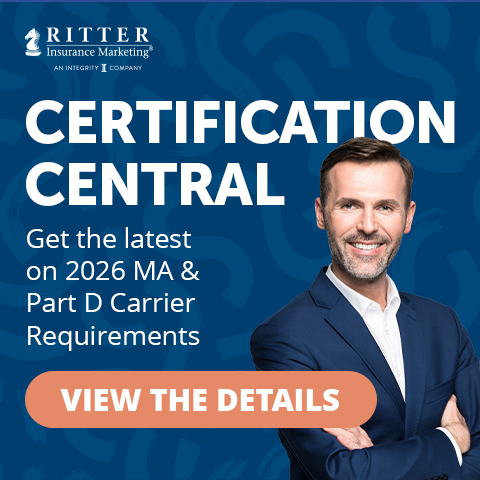The Centers for Medicare & Medicaid Services have some strict rules on what agents can and cannot say during Medicare sales appointments, but pulling them out of the dense Medicare Advantage & Part D Communication Requirements can be tough and time-consuming. Here are some examples to help simplify things!
Note: While we think this post provides a pretty good summary of what you can’t say during Medicare sales, we know it’s not all-encompassing. For all rules on what you can and cannot say during Medicare sales appointments, please read the full Medicare Communications and Marketing Guidelines and the Medicare Advantage & Part D Communication Requirements. Also, check out our summary on what CMS requires agents to discuss prior to Medicare enrollments.
Let’s get into it! During Medicare sales appointments, you can’t say…
”I’m a Medicare agent.”
Of all the rules on “Medicare speak,” this is probably the one that agents recognize the most. An agent who sells Medicare products cannot promote their services in such a way so as to make potential (or current) clients think they’re recommended or endorsed by Medicare itself or the government.
In fact, with CMS’ Final Rule for 2024, you can’t use the word “Medicare” in a misleading way in your business name or website URL. If you’ve named your business something like “Medicare Enrollment Center” and you’ve ever had a prospect ask if you’re affiliated with the government, then it’s time to change your business name. You need to make it clear to everyone else that you’re working as an independent consultant, in person, on your business cards, on your website, and on any other marketing materials.
”These plans are free!”
While certain Medicare insurance plans (e.g., low-premium Medicare Advantage plans) may not have a premium or copays, that doesn’t mean they’re free. Using the word “free” in association with Medicare plans is majorly misleading as these plans can still have copays, coinsurance, and deductibles above $0, as well as specific network requirements and service areas for any $0 benefits. CMS’ marketing guidelines specifically state plans, Part D sponsors, and agents cannot “Use the term ‘free’ to describe a $0 premium, any type of reduction in premium, reduction in deductibles or cost sharing, low-income subsidy, or cost-sharing pertaining to dual eligible individuals."
"This plan is the best one on the market.”
For someone who works in sales, “best” might be hard to avoid saying, but it’s important to take superlatives, especially comparative ones like “best,” out of your vernacular. CMS states that plans, Part D sponsors, and agents cannot “provide information that is inaccurate or misleading,” “make unsubstantiated statements, except when used in logos or taglines,” or “engage in activities that could mislead or confuse Medicare beneficiaries, or misrepresent the MA organization” in the Medicare Advantage & Part D Communication Requirements.
This includes the use of superlatives to describe plans, unless providing recent, factual data that supports the claim and meets CMS requirements. This applies to written and oral communication.
”This plan will cover all of your needs!”
No plan can cover all of its members’ needs. As an agent, you probably learned that early on. Don’t mislead your clients into thinking a single Medicare plan is the magic answer to better health and finances.
“I have any Medicare Advantage plan you could want!”
Unless you actually offer every Medicare Advantage and prescription drug plan in your area, you can’t make claims like this. With the average American having access to almost 43 MA plans, we’d be very impressed if you did offer every single MA and PDP plan. CMS made this rule especially clear in their 2024 Final Rule, where they prohibited marketing benefits where they aren’t available. Remember this especially when marketing 5-star plans, Special Needs Plans (SNPs), and Part B giveback benefits.
CMS is so serious about you representing yourself honestly that they require a disclaimer on printed marketing materials, websites, emails, and phone calls about how many plans you do offer in an area. Learn more about TPMO requirements .
”Your current coverage may or may not change.”
When a client is being enrolled, agents must explain how their current coverage will be affected. Make sure you don’t leave this out when speaking with potential enrollees.
”You have to join this plan, or you won’t have coverage next year.”
Pressuring clients into joining a plan is not a compliant sales practice. If your client is eligible for Medicare, selecting a specific plan does not influence their eligibility. Encourage your clients to enroll in a plan that fits their needs and their budget by asking the right questions. Compliant sales practices help to guarantee your success as an agent.
”These benefits are Medicare-approved.”
You also can’t say phrases like this. Not on your marketing materials and not in person. Phrases that might indicate that the government approves these benefits or plan are also not allowed. Much like saying you’re acting on behalf of Medicare, you cannot say anything similar to, “These benefits were approved by the government,” or “The president authorized these plans.”
“This PPO plan supplements your Medicare benefits.”
Medicare Advantage plans are not Medicare Supplements. Avoid this language so clients don’t get confused.
“If your doctor takes Medicare, they accept this plan.”
Statements such as this one can be misleading. Not every physician that accepts Medicare insurance plans accepts every carrier’s Medicare plans. Encourage your clients to come with a list of preferred doctors or pharmacies and use a tool such as PlanEnroll to make sure that their preferred doctors are in the network of the plan they’re shopping for.
”You need this plan.”
How would you feel if a salesperson told you that you absolutely needed whatever they were trying to sell you? Probably irritated and pressured to buy something you have a gut feeling you probably don’t need. You not only shouldn’t say a client needs a plan because it’s too presumptuous and not something Medicare would approve of, but it’s also just bad marketing. Educating is key, not using “salesy” language.
”If you enroll today, I’ll give you a free gift!”
Bribery does not make for good business. Plus, it’s illegal to offer gifts in exchange for Medicare enrollments.
”Do you have a dental/vision/hearing/hospital indemnity plan?”
This one is tricky because it’s possible that you may be able discuss some ancillary plans during a Medicare sales appointment, but that’s only if your client has checked off those boxes on their Scope of Appointment. Otherwise, you’re not allowed to cross-sell other, non-Medicare types of plans, like dental, vision, hearing, and hospital indemnity plans, during a Medicare appointment. You definitely cannot cross-sell life insurance, annuities, and other products not listed on the Scope of Appointment during a Medicare sales appointment.
”I’m accepting referrals if you want to give me any names and numbers!”
As a Medicare sales agent, you can ask for referrals, but you cannot collect phone numbers. Instead, you can ask your clients to refer you to their family members and friends. Just give your original client a few of your business cards and tell them that anyone who they meet and needs help can contact you.
Want to learn more about generating referrals for Medicare clients? Download our guide, The Insurance Agent’s Guide to Generating Referrals!

Sometimes, the Medicare Advantage & Part D Communication Requirements can be a little hard to digest. All the rules can seem overwhelming, but don’t let them intimidate you. Instead, let us simplify them for you! You can go into Medicare appointments confident in your voice and ability to get sales… just make sure you follow these talking guidelines and you should be fine.
Have additional questions on what you can and cannot say during Medicare sales appointments? Reach out to Ritter’s Sales Team today at 800-769-1847.
Editor’s Note: This was originally published in October 2021. It has been updated to include the most recent regulations from CMS’ Final Rule for Contract Year 2025.







Not affiliated with or endorsed by Medicare or any government agency.
Share Post